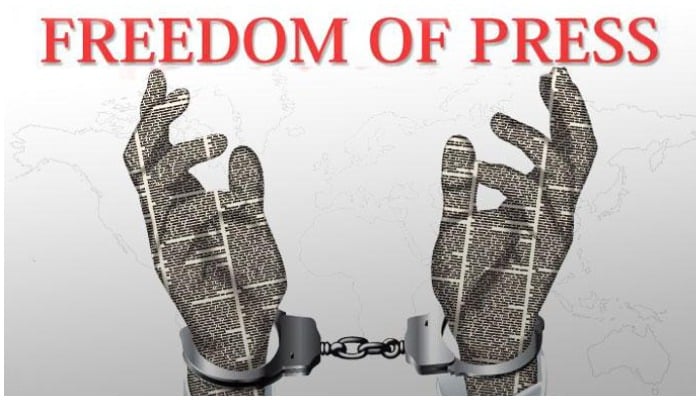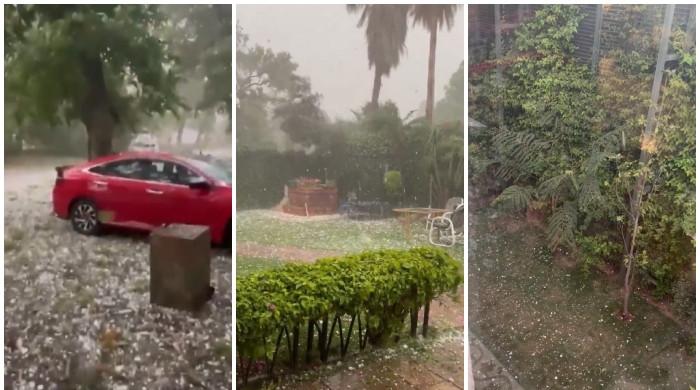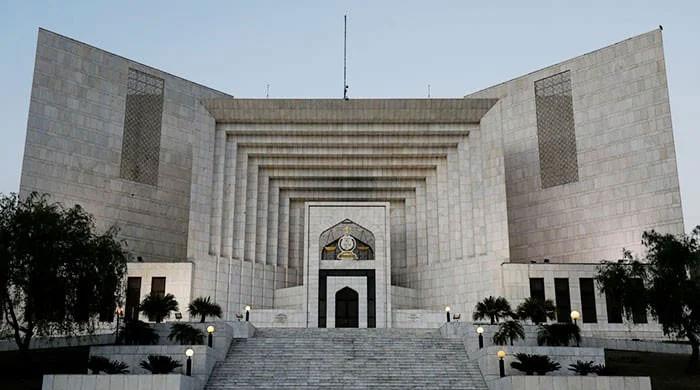Joint Action Committee rejects 'draconian PECA amendments'
JAC says amendments are a "blatant move to stifle media independence, freedom of speech, and dissenting voice"
February 20, 2022

- JAC says amendments are a "blatant move to stifle media independence, freedom of speech, and dissenting voice".
- Says all media bodies will "take any and all legal actions to challenge any attempt to curb media’s independence."
- JAC will, if needed, oppose all such moves with the "full might of its constituent bodies and individual members."
KARACHI: After President Arif Alvi signed two ordinances on Sunday making changes in the Prevention of Electronic Crimes Act, (PECA) 2016, and the Elections Act, 2017, the Media Joint Action Committee (JAC) issued a statement to reject the "draconian amendments."
The JAC, comprising of the Pakistan Broadcasters Association (PBA), All Pakistan Newspapers Society (APNS), Council of Pakistan Newspaper Editors (CPNE), Pakistan Federal Union of Journalists (PFUJ), and Association of Electronic Media Editors and News Directors (AEMEND), said that the amendments brought by the PTI-led government to PECA are a "blatant move to stifle media independence, freedom of speech, and dissenting voices."
The statement said that all media bodies will "take any and all legal actions to challenge any attempt to curb media’s independence and its right to raise voice against any steps to curb freedom of expression as guaranteed in the constitution."
The JAC will, if needed, oppose all such moves with the "full might of its constituent bodies and individual members."
The statement further added that it is "evident that the government is adamant to push through its ill-conceived and draconian agenda through various presidential ordinances". All media bodies stand united to defend freedom of expression and people’s right to information, it added.
President Arif Alvi signs PECA, elections amendment ordinances
President Arif Alvi signed two ordinances on Sunday making changes in the Prevention of Electronic Crimes Act, (PECA) 2016, and the Elections Act, 2017.
Both laws were signed by the president after the Cabinet approved them. The changes made in the electronic crimes act have been made under the Prevention of Electronic Crimes (Amendment) Ordinance, 2022.
Under the ordinance, the definition of a “person” has been broadened to include any company, association, institution, organisation, authority, or any other. Furthermore, anyone found guilty of attacking a person’s “identity” will now be sentenced to five years instead of three years.
The ordinance also states the informant or the complainant shall be “aggrieved person, his authorised representative, or his guardian, where such person is a minor or a member of the public in respect of a public figure or a holder of public office”.
Cases falling under PECA will be supervised by a high court and the trial court will have to conclude the case within six months.
“The court shall submit a monthly progress report of any pending trial to the concerned high court and shall give reasons for the inability of the court to expeditiously conclude the trial,” says the ordinance.
Apart from sending the report to the high courts, copies of the progress report will be sent to the law secretary if the case is registered in the Islamabad Capital Territory. However, if a case is registered in a province, then the copies of the report will be submitted to the “provincial secretaries of prosecution departments, the prosecutor general or advocate general”.
The ordinance also authorises the high court to issue “fresh timelines” of a case if it finds the “reasons” given by the trial court “plausible” and beyond its control.
The ordinance also empowers the high courts to summon federal or provincial government officers to remove any “difficulties, hindrances and obstacles” it finds in the case.
If the law secretaries find that the case was delayed due to the “presiding officer or any of its functionaries” then they may inform the high court. If the high court is of the view that the delay in the disposal of a trial is attributable to the presiding officer of the court or any other court functionary then they can initiate or “direct commencement of appropriate disciplinary proceedings."
The ordinance also empowers the chief justice of every high court to nominate a judge along with other officers.
Changes in election laws
The other ordinance signed by the president makes changes in section 181 of the Election Act, 2017.
The amendments have added a new section titled 181 (A) in the law.
The new law allows a member of “parliament, provincial assembly or elected member of local government, including member holding any other office under the constitution or any other law, will be allowed to visit or address public meetings in “any area or constituency”.
Govt proposes changes in electoral, social media defamation laws
A day earlier, Information Minister Fawad Chaudhry had confirmed that two important bills relating to the election commission's code of conduct and social media have been sent to the federal cabinet for approval.
In a tweet, the information minister said the first proposal seeks permission to allow parliamentarians to run election campaigns.
The second law, if enforced, will make social media defamation a punishable crime.
"Insulting the dignity of another person on social media will be made a punishable offence and the courts will be bound to decide the cases within a period of six months," he said.











